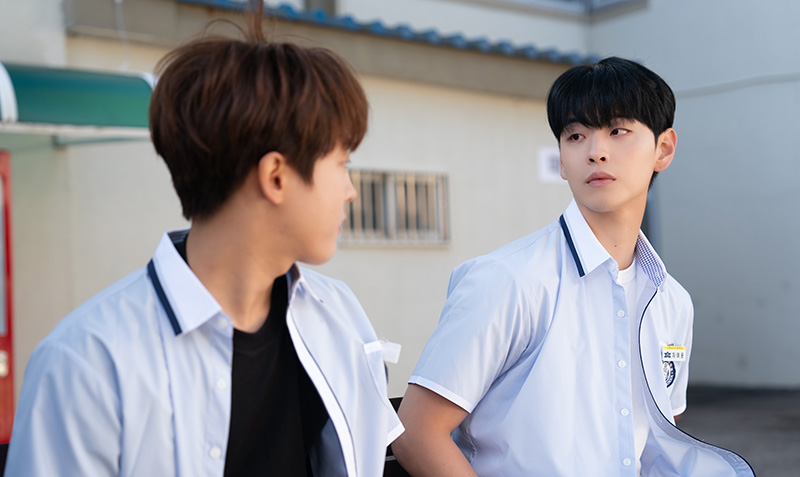The South Korean drama landscape has been thriving in 2025, offering audiences a wide array of fantasy, romance, and character-driven stories. Among these, Love for Love’s Sake (연애 지상주의 구역) has emerged as one of the most touching and imaginative Boys’ Love (BL) dramas of the year. Released on July 4, 2025, and available on Netflix, iQIYI, TVING, and Wavve, the series quickly became a global hit. While its runtime is short—only 8 episodes of about 30 minutes each—the show manages to deliver a surprisingly rich blend of romance, existential fantasy, and themes of healing.
Story & Premise
The narrative follows Tae Myung Ha (Lee Tae-vin), a 29-year-old man who suddenly wakes up inside a video game he used to play. He is transported into the body of his 19-year-old avatar, where he’s tasked with a peculiar mission: bring happiness to Cha Yeo Woon (Cha Joo-wan), a high school athlete struggling with inner turmoil.
As Myung Ha navigates this virtual high school world, he meets a diverse cast of characters—most notably:
- Cha Yeo Woon (Cha Joo-wan): A reserved athlete hiding layers of pain.
- Cheon Sang Won (Oh Min-su): The wealthy, charismatic, but vulnerable “second lead” who steals many hearts.
- Ahn Kyung Hoon (Cha Woong-ki): A steady, supportive friend who grounds the story.
On the surface, this may sound like a playful fantasy romance. But beneath the lighthearted setup, the drama dives into themes of mental health, depression, loneliness, and the power of connection.
Themes & Symbolism
1. Virtual Reality as a Mirror of Real Emotions
The “video game” setting isn’t just a gimmick. It represents how people often hide behind facades or avatars in real life, whether online or in relationships. Myung Ha’s journey is not about beating a game—it’s about confronting the emotional “errors” that prevent Yeo Woon (and himself) from finding happiness.
2. Healing Through Love and Friendship
The show emphasizes that love isn’t always romantic—it’s also about kindness, empathy, and recognizing another person’s pain. Myung Ha’s attempts to heal Yeo Woon echo the way friends, partners, or even strangers can change lives with compassion.
3. Exploring Queer Identity
While Love for Love’s Sake embraces the tropes of BL storytelling—school uniforms, blossoming crushes, emotional confessions—it also offers something deeper. Characters like Cheon Sang Won openly navigate vulnerability, rejection, and the courage of self-expression. The show has been praised for portraying queer love with warmth and dignity rather than sensationalism.
Character Analysis
Tae Myung Ha (Lee Tae-vin)
Myung Ha is the emotional anchor of the series. At first, he’s portrayed as cynical and jaded—understandable for a 29-year-old suddenly stuck in a teenager’s body. Yet, as he interacts with Yeo Woon and others, his sarcastic exterior softens into genuine care. Lee Tae-vin captures this duality—comedic in some scenes, heart-wrenching in others.
Cha Yeo Woon (Cha Joo-wan)
Yeo Woon is written as the “ideal” love interest on the outside—handsome, athletic, and admired. But Cha Joo-wan brings depth, showing the cracks beneath his confident image. Yeo Woon represents the quiet struggles of many young people who suffer silently despite appearing “perfect.”
Cheon Sang Won (Oh Min-su)
Arguably the breakout character, Sang Won steals attention as the wealthy, flamboyant rival who’s much more than a cliché. He embodies vulnerability wrapped in charm, and his exploration of queer identity has been praised as one of the most authentic depictions in BL dramas. Fans often say he deserves his own spin-off.
Ahn Kyung Hoon (Cha Woong-ki)
Though not in the spotlight, Kyung Hoon serves as the drama’s emotional ballast. His loyalty and friendship remind us that not every meaningful relationship needs to be romantic.
Reception & Global Impact
- Domestic Success: In South Korea, the show topped Watcha streaming charts shortly after release.
- Global Recognition: Internationally, it found huge popularity on Netflix and iQIYI. Publications like Teen Vogue and TIME Magazine named it among the best BL and K-dramas of 2024/25.
- Fan Response: Viewers have described the series as both comforting and transformative. Many have shared personal testimonies about how the drama’s themes of depression, loneliness, and healing resonated with their own struggles.
One Reddit user summarized it beautifully:
“This show radiates warmth… it touches topics like suicide, mental health, loneliness, depression. I cried, I laughed, I felt everything.”
Strengths
- Unique Concept: The video game setting differentiates it from typical school romances.
- Emotional Depth: Tackles mental health in a sensitive and moving way.
- Strong Performances: Especially from Lee Tae-vin and Oh Min-su.
- Visuals: Bright, colorful school settings contrasted with emotional intensity create a memorable aesthetic.
- Short & Impactful: Its compact format makes it binge-worthy without filler.
Weaknesses
- Pacing Issues: Some viewers found the middle episodes repetitive, especially the “error” glitch device.
- Limited Runtime: At just 8 episodes, some character arcs—particularly Sang Won’s—feel rushed.
- Fantasy Logic: The rules of the game world are sometimes inconsistent, which can pull viewers out of immersion.
Final Verdict
Love for Love’s Sake is not just another entry in the BL drama wave—it’s a heartfelt story about healing, identity, and the power of human connection. While it has flaws in pacing and world-building, its emotional core more than makes up for them. This is the kind of drama that lingers with viewers long after the credits roll.
